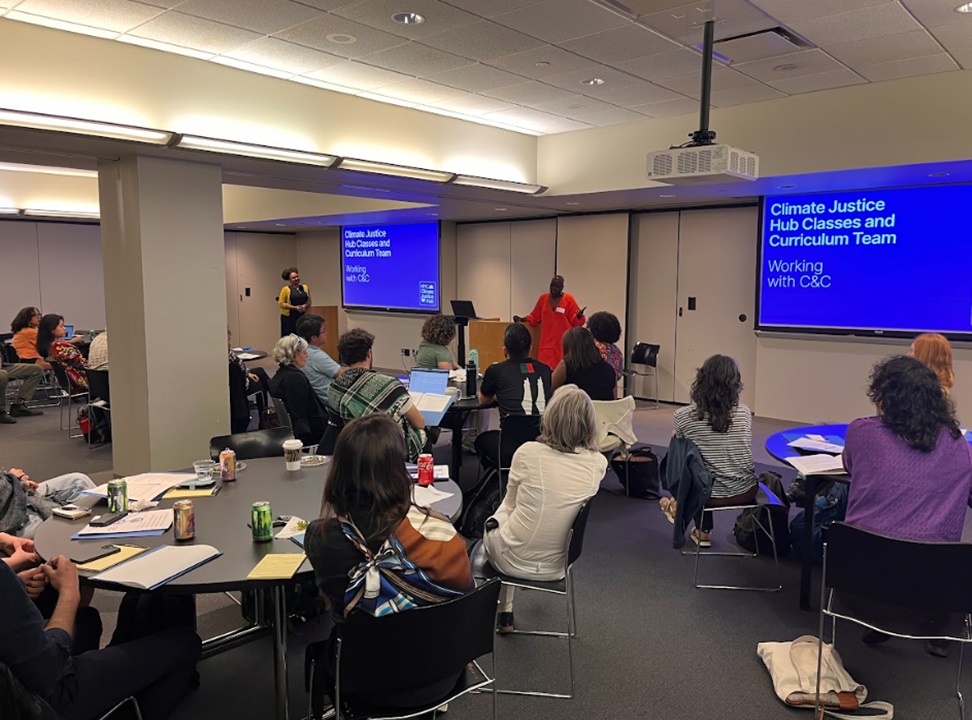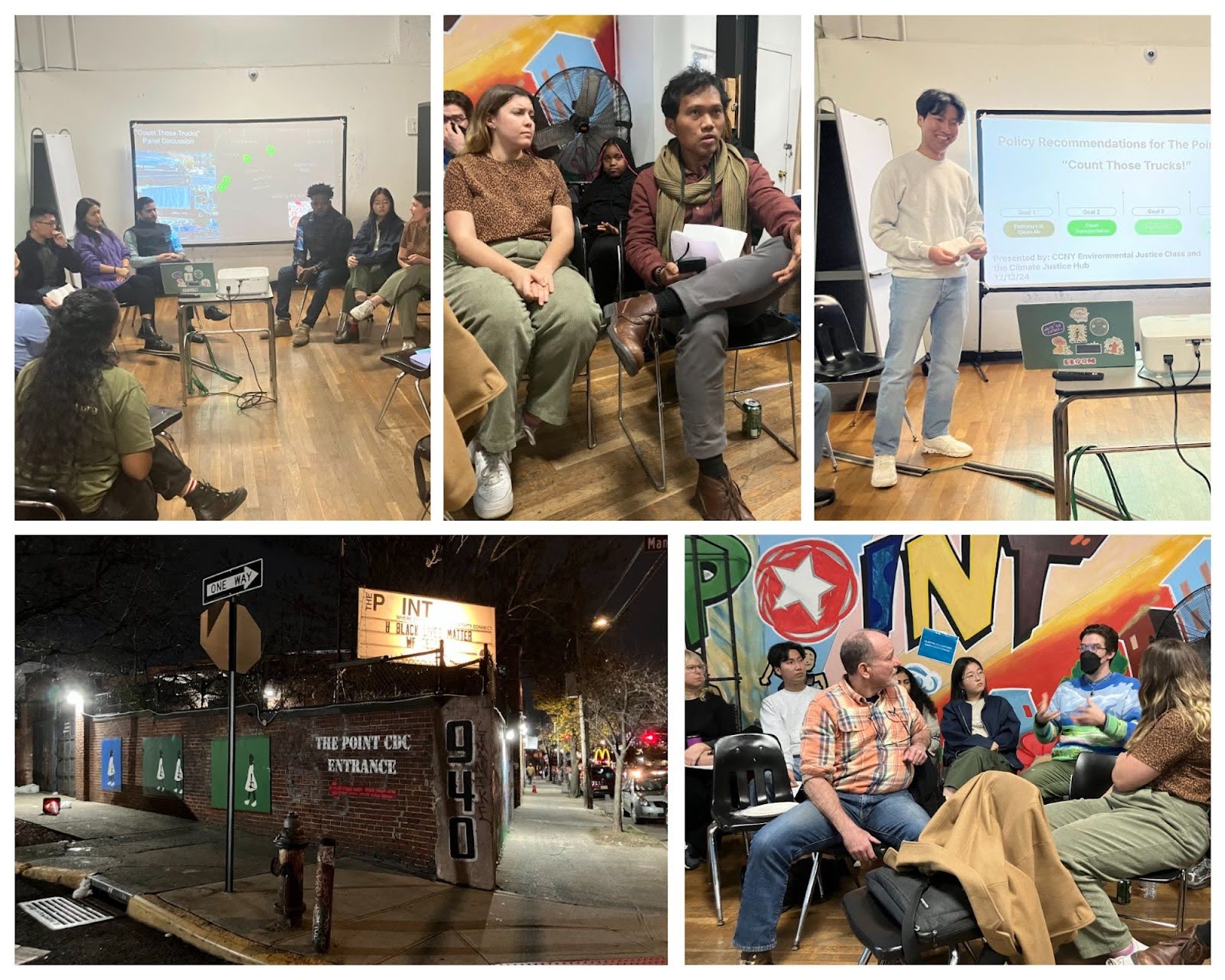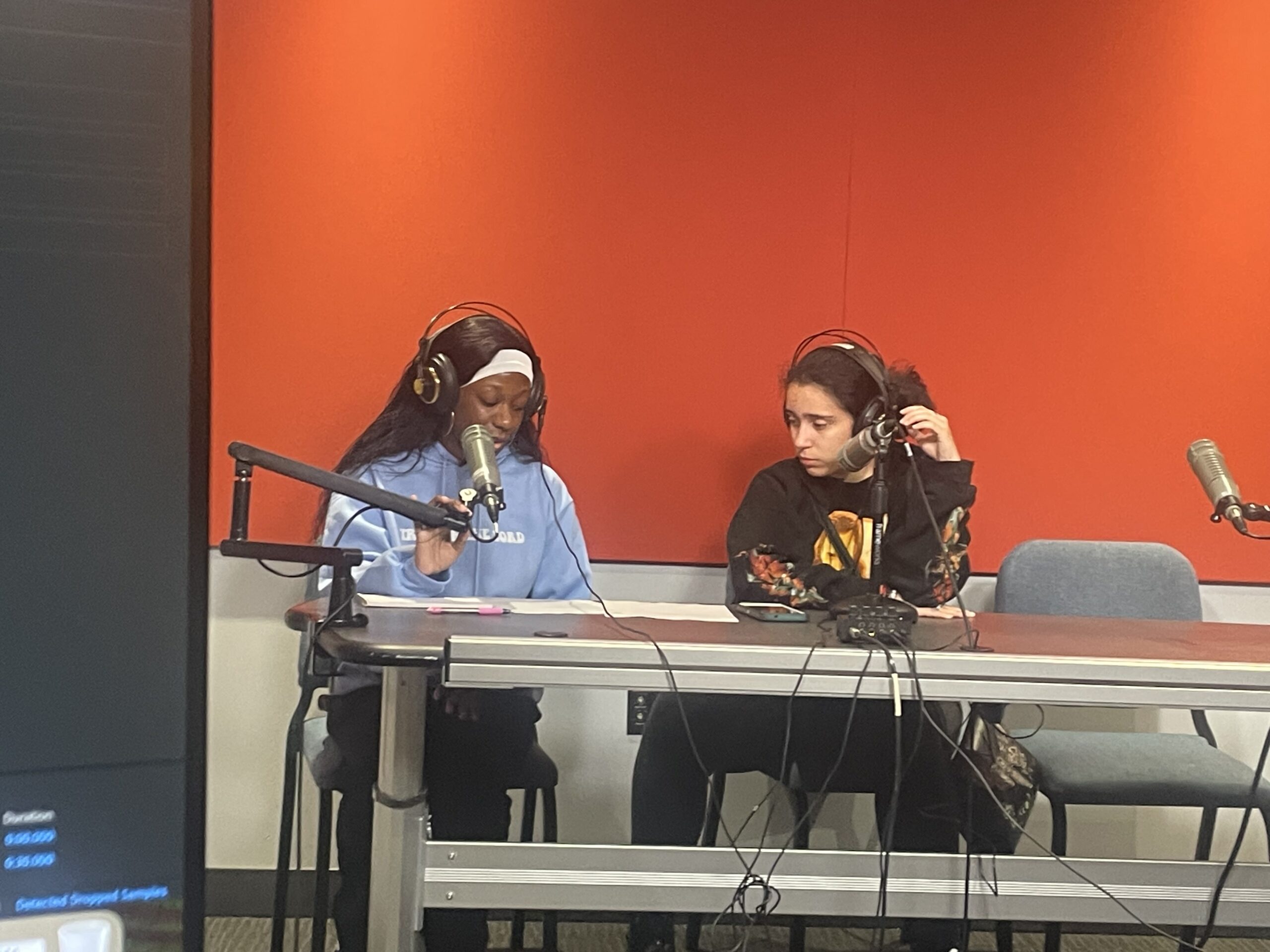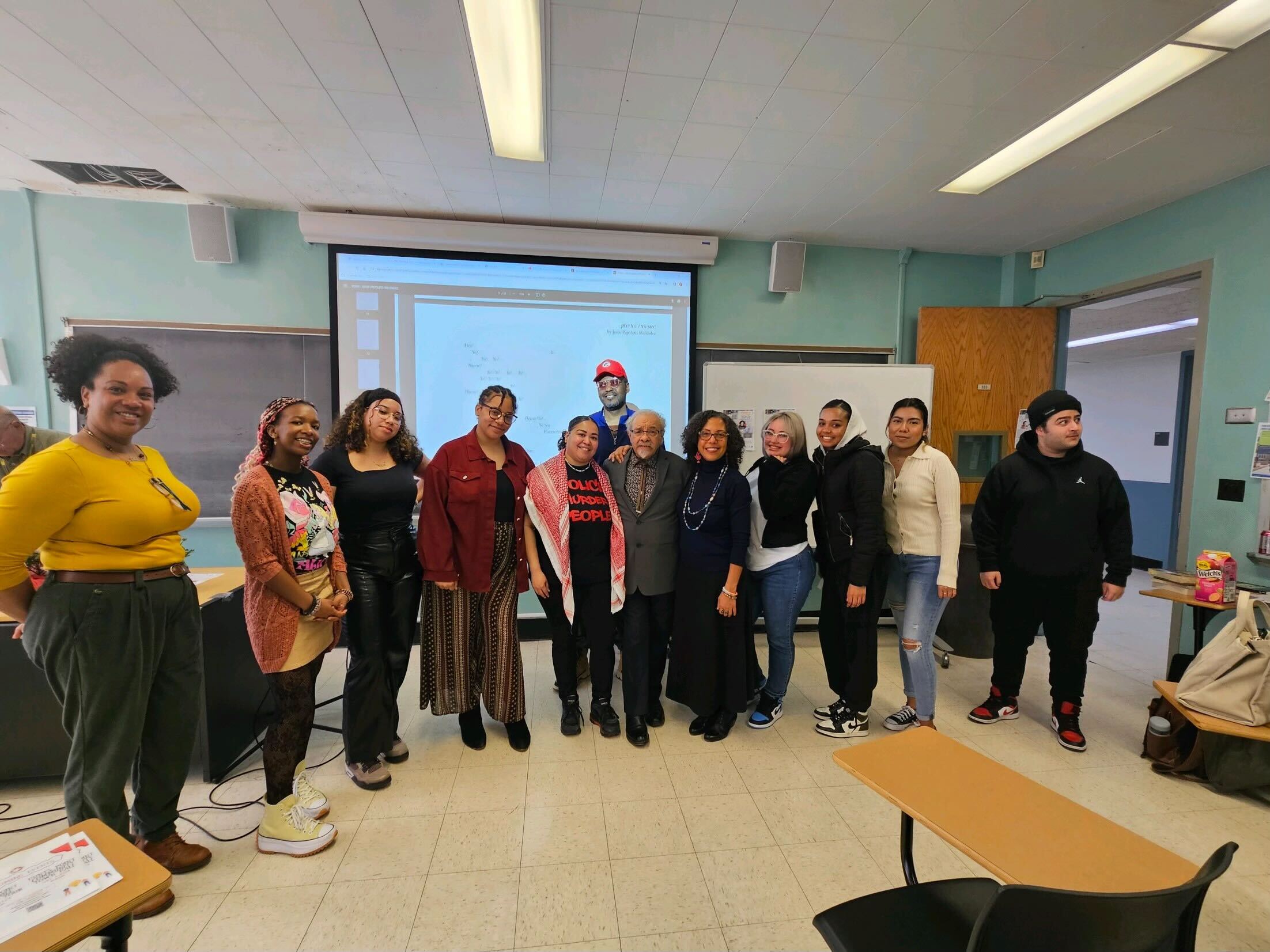Classes & Curriculum
Overview
Through the Classes & Curriculum initiative, community knowledge and learning is fostered between universities and local organizations across a variety of platforms, including site visits and classroom visits, guest speakers, and collaborative capstone projects. Below are some of the exciting collaborations that have recently taken place between CUNY professors, their students, and NYC-EJA member organizations in Spring 2024!

Count Those Trucks: A Roadmap for Tracking Commercial Truck Traffic and Its Impacts on the Residents of Hunts Point
Fall 2025
Lauren Wang (Adjunct Lecturer at City College) collaborated with The Point CDC located in Hunts Point, the Bronx to educate her students on how to conduct original research on environmental injustices and climate action in an urban neighborhood. Twelve students participating in Professor Wang’s Environmental Justice course learned how to collect quantitative data on truck traffic counts and qualitative data on environmental conditions in the neighborhood, including stories about community members’ experiences living and working near last-mile warehouses. Professor Wang led the project along with Tara Pham (Founder/CEO, Numina) in consultation with The Point CDC’s Maria Reyes (Hub Advocate) and Dariella Rodriguez (Director of Community Development.

Storytelling and History Keeping in Bronx Environmental Justice
Spring/Summer 2024
Students in two journalism classes taught by Professor Eileen Markey, a professor of journalism at Lehman College, participated in a project to document current environmental justice campaigns in the Bronx by conducting long form oral history interviews with early participants in the work of the Bronx River Alliance (from the 1970s and 1980s). Students also conducted original journalistic research and interviews to write news articles on current environmental justice campaigns in the Hunts Point section of the South Bronx.
These campaigns highlighted important work being done at The Point CDC on clean air and land use/last mile facilities (Climate Leadership Community Protection Act and the Zoning Resolution Text Amendment), extreme heat and vegetation (mapping heat inequality and Foodscape reports in Hunts Point) and renewable energy transition (PEAK Coalition) among others. Dariella Rodriguez, Director of Community Development at The Point, Maria Reyes, NYC Climate Justice Hub Advocate at The Point, and Basil Alsubee, NYC Climate Justice Hub Advocate at We Stay/Nos Quedamos, guest-lectured and were interviewed by students in these courses. News articles produced by students were then published on Lehman’s Bronx Journal website and promoted via Instagram and TikTok videos.

Poetry In Action
Spring 2024
Jesús Papoleto Meléndez, award-winning poet & pioneer of The Nuyorican Poetry Movement, joined Lehman College students to share his poetry, oral history, and insights on the role of poetry in the struggle for social justice and engage in a dynamic climate justice conversation with Dariella Rodriguez (Director of Community Development at The Point CDC) and Maria Reyes (NYC Climate Justice Hub Advocate at The Point CDC) in a public event facilitated by Professor Mariposa Fernández who teaches Creative Writing and Literature courses, as well as courses in Africana, Latinx and Women’s & Gender Studies at Lehman College and serves on the Advisory Board for the NYC Climate Justice Hub.

Climate Justice Student Documentaries for CUNY TV
Spring 2024
Students enrolled in a course entitled “Climate Justice” taught by Professor Shelly Eversley at Baruch College created a series of short documentaries to be featured on CUNY TV’s “Sustainability Matters.” The students’ work tells stories about how the climate emergency personally impacts them and the communities that shape them. By learning how and why the climate emergency personally affected people, students were able to understand themselves as knowledge producers and as agents who can help repair the world. For the documentary, students interviewed Shaheeda Smith, NYC Climate Justice Hub Advocate at Good Old Lower East Side (GOLES), as well as invited her to visit and lecture the class about these issues. The interdisciplinary practice and collaborative approach brought together science and storytelling, quantitative evidence, and youth culture, to inspire others’ engagement and participation in creating solutions for more just and sustainable futures.
Participating Fall 2024 Courses
Samantha MacBride
- Campus
- Baruch College
- Department
- Public Affairs
- Courses
- Greening and Growing Cities (urban environmental policy and politics); public and nonprofit management; program evaluation
- Level
- Graduate
N/A
Tamar Rothenberg
- Campus
- Bronx Community College
- Department
- History
- Courses
- World Regional Geography, History of the Modern World, History of New York City, and not-yet created, unnamed Introduction to Geography class
- Level
- Undergraduate
N/A
Ann Goodman
- Campus
- Brooklyn College
- Department
- Economics
- Course
- Environmental Economics
- Level
- Undergraduate
The closely intertwined relationship between the human economy and ecological systems. A broad survey of the foundations, key concepts, and methods of ecological economics and sustainable development. We will examine the role of environmental regulation, corporate and private operations, and private-public partnerships in responding to environmental threats and opportunities. We will discuss how businesses and governments can develop sustainable practices. We will address the following fundamental questions: 1, Is it possible to place a monetary value on nature (or the services that nature provides)? 2, Is it possible to substitute man-made capital for natural capital? I.e., as we degrade the natural environment and exhaust natural resources and produced capital goods compensate for these losses? 3, How can we measure the scale of human activities, their impact on ecosystem state, and determine what level is ultimately sustainable?
Naomi Schiller
- Campus
- Brooklyn College
- Department
- Anthropology-Grad Center and Brooklyn College
- Courses
- “People, Nature, Culture” and “Anthropology of Climate Crisis”
- Level
- Undergraduate
Anthropological approaches to climate research; topics include ethnographic approaches to climate science knowledge production; critical examinations of concepts of vulnerability, resilience, sustainability, and the nature/culture binary; anthropological documentation and analyses of climate adaptation studies of energy transitions, technological optimism, and climate justice movements.
Pieranna Pieroni
- Campus
- Brooklyn College
- Department
- Sustainability and College Now
- Courses
- Urban Gardens and Social Justice; Community Roots Environmental Justice
- Level
- Undergraduate
N/A
Lauren Wang
- Campus
- City College
- Department
- Colin Powell School for Civic and Global Leadership & Sustainability in the Urban Environment
- Course
- Environmental Justice
N/A
Mike Menser
- Campus
- CUNY Graduate Center
- Department
- Philosophy
- Course
- EES 79903 – Environmental and Climate Justice: Food, Energy, Water, Governance
- Level
- Graduate
Environmental and climate justice, though distinct historically and conceptually, are remaking how we understand 21st century social movements and politics across diverse sectors, especially those aiming to rectify or repair past injustices and build societies that are just, sustainable and resilient. This seminar will look at their history but more so their present and future, from cultural, philosophical, economic, and political perspectives. We will examine how environmental processes and policies interact with race, class and gender, to differentially affect people’s exposure to environmental harms and their ability to participate in environmental decision-ma ing. After a brief recounting of the origins of both, we will focus on how environmental and climate justice play out in the food energy water nexus with a special focus on governance, self-determination, and the role of the state at different scales. Key concepts for discussion include participatory governance, socio-ecological resilience, food sovereignty, energy democracy/justice, public power, decolonization, anthropocene and water/democracy jus ice. We will look at cases of social movements, community based organizations, programs, projects and policies from NYC, NY state and the Caribbean as well as other national and international cases.
Lea Diaz
- Campus
- CUNY Graduate Center
- Department
- Ralph Bunche Institute
- Courses
- Media & Democracy, Political Communication
- Level
- Undergraduate
N/A
Audrey Lindsey
- Campus
- Guttman Community College
- Department
- Humanities AND Science
- Course
- Intro to Social Justice and Civic Engagement in a Global Society
- Level
- Undergraduate
“AMST 103 (Intro to Social Justice – required of every Guttman student) Using the promise of life, liberty, and the pursuit of happiness to prompt the discussion about rights and equality in US society, this interdisciplinary course provides an introduction to social justice theory and practices. Students examine and conduct research on significant social justice issues in the United States today through an integration of quantitative and qualitative approaches. The course focuses on systems of discrimination and oppression, methods and communities of resistance, and transformative visions of democracy and freedom, with emphasis on how current conditions impact students’ lives and local communities. Through project- and inquiry-based learning, students will practice implementing and integrating qualitative and quantitative methods to explore course material.
AMST 203 (Civic Engagement in a Global Society – Elective with AMST 103 as pre-req) This course will explore global social movements and multiple approaches toward social change using a comparative approach. Students will conduct interdisciplinary research on U.S. culture and history in a global context. Students will identify and analyze various methods of civic engagement, advocacy, and activism, focusing on individuals who act, organizations that mobilize action, and contexts change on the local and global scale. The course highlights the roles of students themselves as civic actors and agents of change, within their educational setting, the communities to which they belong, and the world at large. Through project- and inquiry-based learning, students will practice implementing and integrating quantitative and qualitative research methods into action plans that address injustice and conflict.”
Lori Kent
- Campus
- Hunter College
- Department
- Art & Art History
- Courses
- (1) Theory & Criticism in Visual Arts Education, (2) Special Topics: MA Project in Visual Arts Education
- Level
- Graduate
N/A
Hun Bok Jung
- Campus
- Kingsborough Community College
- Department
- Physical Sciences
- Course
- General Chemistry
- Level
- Undergraduate
N/A
Ryan Mann-Hamilton
- Campus
- LaGuardia CC
- Department
- Social Science
- Course
- Introduction to Cultural Anthropology
- Level
- Graduate and Undergraduate
N/A
Alice Baldwin-Jones
- Campus
- LaGuardia CC
- Department
- Social Science
- Course
- Introduction to Cultural Anthropology
- Level
- Undergraduate
N/A
Nathan Hosanna
- Campus
- LaGuardia CC
N/A
Elia Machado
- Campus
- Lehman College
- Department
- Earth, Environmental and Geospatial Sciences
- Courses
- GIS, Remote Sensing
- Level
- Graduate
Fundamentals of remote sensing, energy interactions between the sun, atmosphere, and features on the earth surface. Structure of raster data, cell size, and both passive and active remote sensing. Spatial, spectral, radiometric and temporal resolution characteristics of different multispectral remotely sensed data using specialized image analysis software.
Eileen Markey
- Campus
- Lehman College
- Department
- Journalism
- Courses
- Fundamentals of Multimedia Journalism/Advanced Multimedia Investigations
N/A
Mariposa Fernandez
- Campus
- Lehman College
- Department
- English
- Courses
- African American & Black Diasporic Literatures/Topics in African American History & Culture
- Level
- Undergraduate
N/A
Bengi Sullu
- Campus
- Medgar Evers
- Department
- Social & Behavioral Sciences
- Course
- Culture, Society and Social Change
This interdisciplinary course is designed to give a broad overview of the subject matter covered by the Social Sciences and to introduce students to basic concepts, approaches, and principles governing Social Sciences. The underlying theme of the course is culture, society and social change. Attention is given to the historical development, continuity and changes in social institutions, culture and society. Among the topics discussed in this course will be the contributions of women to the development of social sciences and gender issues as they pertain to social inequality in the United States.
Kara Schlichting
- Campus
- Queens College
- Department
- History
- Courses
- Urban Environment; History of New York City; Cities in American History
- Level
- Graduate
Americans often think of cities as places without nature, and nature is often defined as the antithesis of urban spaces. This course challenges this assumption, drawing on scholarship from the growing field of urban environmental history to uncover the interconnections between urban America and the natural world. We will explore the process of urbanization, one of the fundamental themes of American history, to examine how nature and cities have shaped one another. Readings and discussion topics will survey urban spaces in the nation across space and time, include the role nature played in the situating of cities across North America; colonial and nineteenth-century cultural reactions to urbanization; the social and economic relationships between cities and their hinterlands; the debates around public parks, pollution, and public health; and gentrification and the urban environmental justice movement. The goal of this course is to investigate how American society has drawn upon nature to build and sustain urban growth, and, in the process, transformed the natural world and ideas about it.
Prash Naidu
- Campus
- The City College of New York
- Department
- Anthropology and Interdisciplinary Programs
- Courses
- Environmental and Climate Justice
- Level
- Undergraduate
N/A